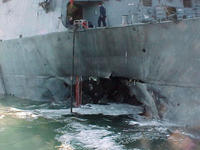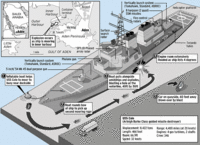
At 11:18 on the morning of October 12, 2000, as USS COLE (DDG 67) was refueling in Aden Harbor, Yemen, suicide bombers detonated an explosive-laden boat directly against the port side of the ship. The resulting blast killed 17 Sailors, wounded 37 others, and tore a hole forty by sixty feet in the ship's hull. In the aftermath of the explosion, the crew of USS COLE fought tirelessly to free shipmates trapped by the twisted wreckage and limit flooding that threatened to sink their ship. The crew's prompt actions to isolate damaged electrical systems and contain fuel oil ruptures prevented catastrophic fires that could have engulfed the ship and cost the lives of countless men and women. Skillful first aid and advanced medical treatment applied by the crew prevented additional death and eased the suffering of many others. Drawing upon their Navy training and discipline, the crew heroically conducted more than 96 hours of sustained damage control in conditions of extreme heat and stress. Deprived of sleep, food and shelter, they vigilantly battled to preserve a secure perimeter and restore stability to engineering systems that were vital to the ship's survival. By their sacrifice and bravery in the face of daunting adversity, the crew of USS COLE personified Honor, Courage, and Commitment. After a successful 14-month effort to repair the damage, USS Cole (DDG 67) departed Pascagoula, Miss., on April 19 2002, and returned to its homeport of Norfolk, Va.

What remains to be told is why our then President, William Jefferson Clinton, placed one of our ships pierside in a hostile country for refueling. Underway replenishment is an everyday occurence in the US Navy, and pierside refueling is only a politically motivated occurence.
Gen. Tommy Franks said the decision to refuel in Yemen, which was designated as a safe haven for terrorists in the State Department's annual report on terrorism, was based on "operational as well as geostrategic factors and included an assessment of the terrorist and conventional threats in the region." Yemen was far from alone in being deemed a high risk area, the general said, noting that "As of December 1998, 14 of the 20 countries in the USCENTCOM AOR (Area of Responsibility) were characterized as 'High Threat' countries." It is often lost in history that this terrorist attack was one of the first by Osama Bin Laden against the United States of America.
The response by the Clinton administration was so weak that it emboldened Al Quaida, arguably leading to the terrible events that followed. Bombing a US Navy ship is an act of war. The United States failed to respond appropriately.
Labels: Military, Terror, US Navy
 At 11:18 on the morning of October 12, 2000, as USS COLE (DDG 67) was refueling in Aden Harbor, Yemen, suicide bombers detonated an explosive-laden boat directly against the port side of the ship. The resulting blast killed 17 Sailors, wounded 37 others, and tore a hole forty by sixty feet in the ship's hull. In the aftermath of the explosion, the crew of USS COLE fought tirelessly to free shipmates trapped by the twisted wreckage and limit flooding that threatened to sink their ship. The crew's prompt actions to isolate damaged electrical systems and contain fuel oil ruptures prevented catastrophic fires that could have engulfed the ship and cost the lives of countless men and women. Skillful first aid and advanced medical treatment applied by the crew prevented additional death and eased the suffering of many others. Drawing upon their Navy training and discipline, the crew heroically conducted more than 96 hours of sustained damage control in conditions of extreme heat and stress. Deprived of sleep, food and shelter, they vigilantly battled to preserve a secure perimeter and restore stability to engineering systems that were vital to the ship's survival. By their sacrifice and bravery in the face of daunting adversity, the crew of USS COLE personified Honor, Courage, and Commitment. After a successful 14-month effort to repair the damage, USS Cole (DDG 67) departed Pascagoula, Miss., on April 19 2002, and returned to its homeport of Norfolk, Va.
At 11:18 on the morning of October 12, 2000, as USS COLE (DDG 67) was refueling in Aden Harbor, Yemen, suicide bombers detonated an explosive-laden boat directly against the port side of the ship. The resulting blast killed 17 Sailors, wounded 37 others, and tore a hole forty by sixty feet in the ship's hull. In the aftermath of the explosion, the crew of USS COLE fought tirelessly to free shipmates trapped by the twisted wreckage and limit flooding that threatened to sink their ship. The crew's prompt actions to isolate damaged electrical systems and contain fuel oil ruptures prevented catastrophic fires that could have engulfed the ship and cost the lives of countless men and women. Skillful first aid and advanced medical treatment applied by the crew prevented additional death and eased the suffering of many others. Drawing upon their Navy training and discipline, the crew heroically conducted more than 96 hours of sustained damage control in conditions of extreme heat and stress. Deprived of sleep, food and shelter, they vigilantly battled to preserve a secure perimeter and restore stability to engineering systems that were vital to the ship's survival. By their sacrifice and bravery in the face of daunting adversity, the crew of USS COLE personified Honor, Courage, and Commitment. After a successful 14-month effort to repair the damage, USS Cole (DDG 67) departed Pascagoula, Miss., on April 19 2002, and returned to its homeport of Norfolk, Va.  What remains to be told is why our then President, William Jefferson Clinton, placed one of our ships pierside in a hostile country for refueling. Underway replenishment is an everyday occurence in the US Navy, and pierside refueling is only a politically motivated occurence. Gen. Tommy Franks said the decision to refuel in Yemen, which was designated as a safe haven for terrorists in the State Department's annual report on terrorism, was based on "operational as well as geostrategic factors and included an assessment of the terrorist and conventional threats in the region." Yemen was far from alone in being deemed a high risk area, the general said, noting that "As of December 1998, 14 of the 20 countries in the USCENTCOM AOR (Area of Responsibility) were characterized as 'High Threat' countries." It is often lost in history that this terrorist attack was one of the first by Osama Bin Laden against the United States of America. The response by the Clinton administration was so weak that it emboldened Al Quaida, arguably leading to the terrible events that followed. Bombing a US Navy ship is an act of war. The United States failed to respond appropriately.
What remains to be told is why our then President, William Jefferson Clinton, placed one of our ships pierside in a hostile country for refueling. Underway replenishment is an everyday occurence in the US Navy, and pierside refueling is only a politically motivated occurence. Gen. Tommy Franks said the decision to refuel in Yemen, which was designated as a safe haven for terrorists in the State Department's annual report on terrorism, was based on "operational as well as geostrategic factors and included an assessment of the terrorist and conventional threats in the region." Yemen was far from alone in being deemed a high risk area, the general said, noting that "As of December 1998, 14 of the 20 countries in the USCENTCOM AOR (Area of Responsibility) were characterized as 'High Threat' countries." It is often lost in history that this terrorist attack was one of the first by Osama Bin Laden against the United States of America. The response by the Clinton administration was so weak that it emboldened Al Quaida, arguably leading to the terrible events that followed. Bombing a US Navy ship is an act of war. The United States failed to respond appropriately.








1 Comments:
Hey...This is a much better post than the one I put up...I remember the day so well...at work, everyone was upset. The days follwoing the attack..people getting more upset at the lack of leadership on the Presidential level. Guess Clinton had other things he was doing.
Post a Comment
<< Home